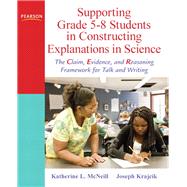
Note: Supplemental materials are not guaranteed with Rental or Used book purchases.
Purchase Benefits
Katherine L. McNeill is an Assistant Professor of science education at Boston College. A former middle school science teacher, she received her doctorate in science education from the University of Michigan. Her research focuses on helping students with diverse backgrounds become interested in science and learn both science content and scientific inquiry practices. Specifically, she has recently focused on how to support students in engaging in scientific explanation and argumentation in both talk and writing. Her research has been generously funded by the National Science Foundation (NSF). She has published numerous book chapters and journal articles from this work, including articles in the Journal of Research in Science Teaching, Science Education, The Journal of the Learning Sciences, and International Journal of Science Education.
Joseph Krajcik, a Professor at the University of Michigan, develops classroom environments in which students find solutions to important intellectual questions that subsume essential learning goals. He is a fellow of AAAS and AERA, served as president of National Association for Research in Science Teaching in 1999, and received guest professorships from Beijing Normal University and the Weizmann Institute of Science. In 2009, he was named a distinguished professor at Ewha Woman’s University in South Korea and served as a faculty member in the Institute for Global Science, Technology and Society Education. In 2010, he received the Distinguished Contributions to Science Education Through Research Award from NARST.
Chapter 1: Importance of Supporting Students in Scientific Explanation
1.1. The role of explanations in science
1.2. Scientific explanations in the classroom
1.3. Benefits of scientific explanations
1.4. Alignment with the national science standards
1.5. Student challenges with scientific explanations
1.6. Check Point
1.7. Study Group Questions
Chapter 2: Framework for Constructing Scientific Explanations
2.1. Students’ understandings of scientific explanations
2.2. Framework for constructing scientific explanations
2.3. Video Example – Introducing the instructional framework
2.4. Examples of scientific explanations
2.5. Increasing the complexity of the framework over time
2.6. Benefits of the framework for all learners
2.7. Check Point
2.8. Study Group Questions
Chapter 3: Designing Learning Tasks for Your Science Curriculum
3.1. Considerations for designing learning tasks
3.2. Step 1: Identify opportunities in the curriculum
3.3. Examples of learning tasks
3.4. Step 2: Design complexity of the learning task
3.5. Step 3: Create Classroom Support
3.6. Check Point
3.7. Study Group Questions
Chapter 4: Teaching Strategies to Integrate into Classroom Instruction
4.1. Teaching strategies
4.2. Supporting all learners
4.3. Check Point
4.4. Study Group Questions
Chapter 5: Developing Assessment Tasks and Rubrics
5.1. Overview of the development process
5.2. Step 1: Identify and unpack the content standard
5.3. Step 2: Select scientific explanation level of complexity
5.4. Step 3: Create learning performances
5.5. Step 4: Write the assessment task
5.6. Step 5: Review the assessment task
5.7. Step 6: Develop specific rubric
5.8. Check Point
5.9. Study Group Questions
Chapter 6: Using Rubrics and Student Data to Inform Instruction
6.1. Role of assessment in creating a supportive learning environment
6.2. Using rubrics to support student learning
6.3. Providing students with feedback
6.4. Check Point
6.5. Study Group Questions
Chapter 7: Supporting Learning Over Time
7.1. Developing a classroom culture
7.2. A learning progression for scientific explanation
7.3. Connecting to other content areas
7.4. Check Point
7.5. Study Group Questions
The New copy of this book will include any supplemental materials advertised. Please check the title of the book to determine if it should include any access cards, study guides, lab manuals, CDs, etc.
The Used, Rental and eBook copies of this book are not guaranteed to include any supplemental materials. Typically, only the book itself is included. This is true even if the title states it includes any access cards, study guides, lab manuals, CDs, etc.